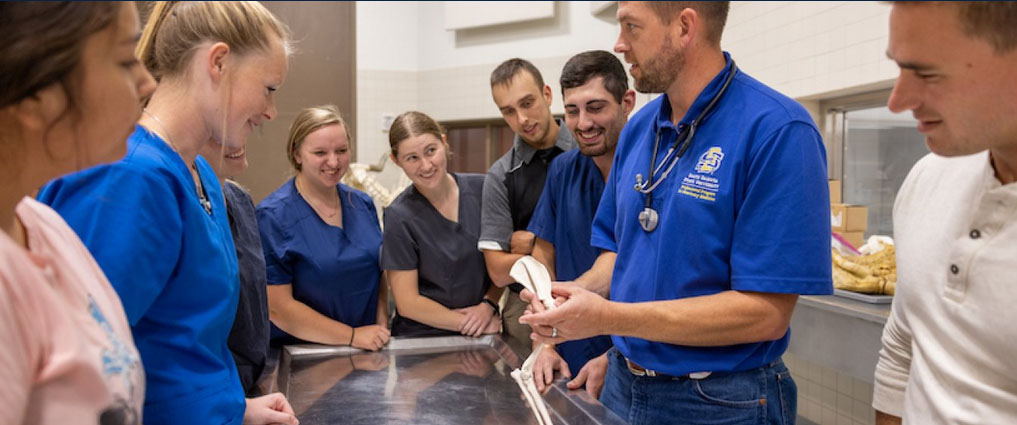



Program Coordinator/Contact
Angela Pillatzki, Associate Professor, Department Head
Jessica Juarez, Assistant Professor, Director of the Professional Program in Veterinary Medicine
Department of Veterinary and Biomedical Sciences
Animal Disease Research and Diagnostic Laboratory 1105, Box 2175
605-688-5171
Program Information
The University of Minnesota College of Veterinary Medicine (UMN CVM) and South Dakota State University (SDSU) have partnered together to create the Professional Practice in Veterinary Medicine (PPVM) program. This 2+2 program focuses on careers in food animal or mixed animal medicine in rural communities. The SDSU Professional Program in Veterinary Medicine is designed to prepare future veterinarians to serve in critical roles across the spectrum of animal health, environmental health, and public health.
SDSU will admit a class of up to 20 students to complete their first two years of veterinary school at South Dakota State University in Brookings, South Dakota. The cohort will transfer and complete their last two years at the UMN CVM in St. Paul, MN, and graduate with a Doctor of Veterinary Medicine (DVM) degree, issued by the UMN. The collaborative program will meet all accreditation requirements of the American Veterinary Medical Association Council on Education for the UMN CVM accredited program. Once students complete the required pre-veterinary curriculum, they can apply to the Professional Program.
While at SDSU, students will have a rigorous, yet enriched learning experience. The class size is designed to provide the opportunity for students to have supportive learning communities and hands-on practical experience working with food and companion animals, as well as making it possible to work closely in a world-class diagnostic facility with dedicated faculty and scientific researchers. The integrated DVM curriculum uses active learning and builds the relationship between the basic sciences and the clinical cases graduates will see in their practices. During the first three years of the DVM program, students focus on the study of the normal animal, the pathogenesis of diseases, and the prevention, alleviation, and clinical therapy of diseases. The program concludes with 13 months of clinical rotations in the University of Minnesota Veterinary Medical Center, where students learn methods of veterinary care and develop skills needed for professional practice. Students can choose from more than 65 rotations, ranging from Acupuncture to Zoological Medicine. The fourth year includes up to 10 weeks of externship experiences at off-campus sites of the student’s choice. DVM students attend class full time, Monday through Friday, from approximately 8 a.m. to 5 p.m. Students do not have classes during the summer semesters between their first and second, and second and third years of the program. Students attend class for one full calendar year, including summer semester, during their fourth year.
Accreditation, Licensure, and Certification
The DVM degree from the SDSU PPVM and UMN CVM qualifies graduates to take the licensing exam in every state provided they pass the national exam and meet the state non-academic guidelines (background check, etc).
DVM students must pass both state and national board licensing exams in order to practice. The national exam is called the North American Veterinary Licensing Examination and is offered in the fall and the spring. Those wishing to practice in South Dakota must also take the South Dakota Board of Veterinary Medicine licensing exam. Information regarding licensure in other states can be found National Board of Veterinary Medical Examiners.
Additional licensing requirements may vary from state to state. Please check with any state you are considering practicing in for specific details.
Course Delivery Format
Courses are delivered through lecture, laboratory, online, hybrid, and hands-on, field-based experiences.